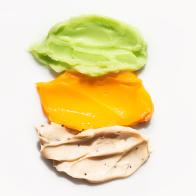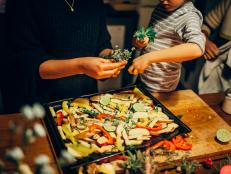3 Best Tips for Cooking with Kids at Every Age
Experts say kids are more likely to eat what they had a hand in making.


Hoxton/Sam Edwards
When my kids were really little my friends assumed that, because I love cooking so much, our days must be spent having a ton of fun in the kitchen together — but nothing could have been further from the truth. Every time my toddlers entered MY kitchen, it felt like an intrusion into a sacred place, the place I went to escape and unwind. And while I knew that cooking offered a plethora of opportunities for teaching everything from motor skills to math and self-reliance, I fretted about the mess the kids were making while I was trying to make dinner in a rush or the possibility of having to throw something out because the result was inedible.
My kids are 8 and 12 years old now, and as time went on they turned the tables and taught me a valuable lesson: to chill out and go with the flow. Here are a few ways to help you do just that while cooking with children:
Choose age-appropriate tasks

Tara Moore
In hindsight, I realize that part of my frustration might have been self-inflicted. It’s not like I was handing my 4-year-old a chef’s knife and expecting perfectly julienned carrots, but I probably expected too much too soon. Toddlers can help with rinsing produce, pouring and stirring, and they can graduate to cracking eggs and measuring as they get comfortable in the kitchen. They probably won’t be ready for knife skills or firing up the stove until 8 or 9 — although experts emphasize that this age is just an average. It really depends on the maturity level of your child, and you should supervise until you feel confident that they understand how to stay safe.
Start small to build confidence

Caiaimage/Paul Bradbury
A great way to help kids feel invested in what they’re making is to get them involved right from the get-go by letting them help make the menu. Steer them toward easy projects like homemade pizzas (perhaps with store-bought elements at first), chocolate chip cookies or smoothies that allow them to experiment. Most experts say kids are more likely to eat things they’ve chosen and made themselves, but I’ve got to be honest — I rarely found that to be true with my kids. Still, I never regret what they learned in the kitchen, whether they gobbled it up at the end or not.
Find a day when you’re not in a rush

Peter Muller
It’s heartbreaking to say no to a child when they’re begging to help make dinner, but the reality is that it’s often just not practical when you’re moving around like a tornado because you finished work at 4 p.m., need to get the kids to a 6 p.m. school event and need to have dinner on the table by 5 p.m. When the whining and waterworks start, I calmly promise to make something they love to help with (and eat), such as banana bread or pancakes, and we make a firm date to do it on a day that isn’t quite so frantic. Making time on a less hectic day might just save you time in the long run, right after your budding sous chefs learn to take over the kitchen and make dinner all on their own.
































































